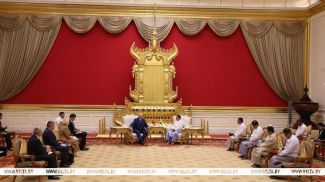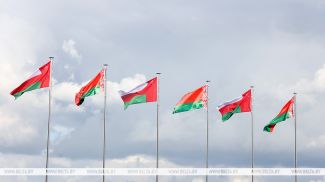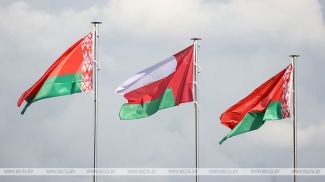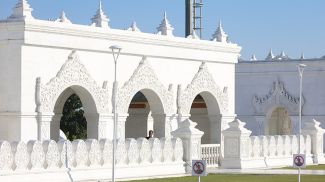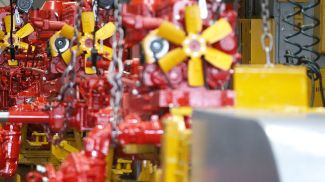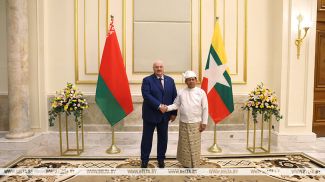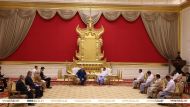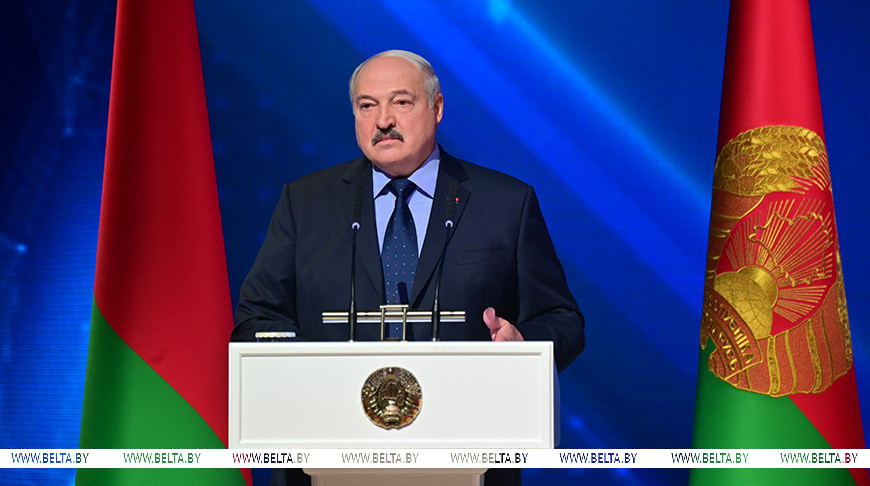
News of the story
"President's Week"
The work schedule of the Belarus president is always full of events. Aleksandr Lukashenko holds conferences and working meetings on the most topical matters concerning the country’s development, regularly visits the regions, goes on foreign trips and welcomes foreign guests, talks to reporters, signs decrees and laws. And even if there are no public events, it does not mean that the head of state does not work. It must be said that even when he relaxes, for instance, by playing ice hockey or chopping firewood, Aleksandr Lukashenko happens to find the time to give yet another instruction. All the decisions must be prompted by life, he likes to say.
The President’s Week project is intended for those, who want to keep up with the head of state, be up-to-date on the latest statements and decisions of the Belarusian leader.
Aleksandr Lukashenko spent past week not only in different cities but also in different countries.
The week started with negotiations with the governor of Russia’s Altai Territory in Minsk. Discussions about this topic continued on Friday, 31 July in a phone call between the two presidents. Aleksandr Lukashenko and Vladimir Putin discussed security matters, forthcoming events, visits, and the realization of previously reached agreements.
On Tuesday Aleksandr Lukashenko attended the Belarus Media Forum in Mogilev. Victories of domestic journalism and shortcomings were discussed. Aspiring reporters should bear in mind that everyone needs high quality and that it is impossible to win information warfare battles only with a gutsy style. The key thing is not to lose the country as the president formulated the overarching task.
The Orsha-based plant Legmash was the next destination on the itinerary of the head of state. The plant has been making only products for the civilian sector until recently. Today the enterprise takes an active part in government defense contracts. Due to present-day needs but these products will always be in demand, Aleksandr Lukashenko is convinced. In the end it is necessary to defend the country while domestic defense products directly contribute to ensuring the country’s sovereignty in military field.
In Orsha Aleksandr Lukashenko also answered a number of questions asked by Legmash workers. He talked about agreements with Putin concerning further advancement of cooperation in space exploration and plans to extend the preferential loan program for buying Belarusian goods. Questions were also asked about vacations of the head of state. It turned out the Belarus president simply cannot take a vacation like an ordinary citizen.
Aleksandr Lukashenko also inspected the presidential experimental fields in his hometown area and tested a new Belarusian axe he had been given as a gift.
The president started a state visit to Mongolia at the end of the week. The Belarusian leader managed to visit the Chinggis Khaan National Museum on Sunday before the main negotiation day and admired the exposition.
These and other details of the presidential schedule are covered by BelTA’s special project President’s Week.
SIBERIA’S BREADBASKET. Will the visit of guests from Altai Territory to Belarus open a new page in cooperation development?
On Monday, 27 May Belarus President Aleksandr Lukashenko traditionally started the work week with a meeting with the head of a Russian constituent territory. As a recent rule, the first day of the week on the presidential schedule is dedicated to Belarusian-Russian regional cooperation. A delegation of Russia’s Altai Territory led by Governor Viktor Tomenko came to Minsk this time.
He came to Belarus as a guest and to visit the land of the ancestors (his mother comes from the area around Mozyr). The day before the meeting at the Palace of Independence Viktor Tomenko went to that area and talked to relatives. “It is very important. It inspires. At least it improves the mood significantly,” Aleksandr Lukashenko noted at the beginning of the meeting.
So, Belarus is definitely not stranger’s land for the head of the Altai Territory administration. The fact gives a decent edge from the point of view of the prospects of advancing the relations. On the whole, Altai Territory is spiritually very close to Belarusians. The region is rightfully considered Siberia’s breadbasket, one of the largest agricultural regions of Russia.

The president expressed hope that the visit of the Altai Krai delegation will help overcome some setback in trade and will give a boost to efforts to expand existing partnerships and create new ones. The head of state outlined a number of promising avenues of cooperation. “I intend to give them a serious impetus with your help,” the Belarusian leader noted.
The promising cooperation avenues include deliveries of agricultural machines coupled with aftersales service and possible personnel training; cooperation in mechanical engineering (production of components, replacement of lift equipment), deliveries of a broad range of passenger vehicles and special-purpose vehicles; animal husbandry; unmanned systems for civilian applications; sorting and processing of solid municipal waste; cooperation in humanitarian affairs; the development of tourism and transport links, including possible establishment of direct air service between Minsk and Barnaul.

Aleksandr Lukashenko mentioned Belarus’ openness to a substantive conversation about all the cooperation avenues. “We would very much like to cooperate with your region,” the head of state concluded.
RELIANCE ON REPORTERS. What does Lukashenko think about performance of Belarusian mass media?
Aleksandr Lukashenko took part in the Belarus Media Forum in Mogilev on 28 May. It was probably the first time the head of state communicated with mass media in this manner: more than 1,000 participants, including reporters, heads of mass media, bloggers, press secretaries, experts in the sphere of communication, representatives of the relevant higher education institutions, and ideologists convened for the forum. The meeting evolved into a genuine domain-specific government conference where tasks were set and accomplishments, shortcomings, and the processes going on in the country and around it were sincerely discussed.

The president gave a number of pieces of practical advice, mentioned his attempts to write in his youth, heard out speeches by forum participants, and answered questions of reporters. The head of state was asked what topic he would like to write about if he worked for a mass media outlet. Aleksandr Lukashenko responded by saying he would definitely criticize shortcomings, would fight against them, and would not bow to respected leaders: “I would definitely write about things around us and the things that benefit people. I’ve seen disadvantages of life in the countryside since I was a kid. I saw hardships, complications, and a lot of injustice. And I terribly wanted to fix all of it. After breaking my entire life I went to the countryside. And I don’t regret it. So I would write about that, too.”
Before the main part of the forum began, the head of state was made familiar with an exhibition of multimedia projects of regional mass media that have been implemented over the last two years. Primarily the effectiveness of individual projects was evaluated: circulation, viewership and readership ratings.
“It is the most important thing,” the Belarusian leader stressed. Aleksandr Lukashenko remarked that one must not delude themselves but should keep in mind these criteria.
Speaking at the media forum, Aleksandr Lukashenko remarked that he has always treated the work of reporters with great respect because he understands their work. Moreover, the president urged executives and civil servants to rely on reporters in their line of work. And to promptly respond to possible criticism in mass media among other things. At the same time judging from statements made by the head of state he is not fond of fangless and indifferent journalism. On the contrary, he encouraged reporters to promptly notice and respond to various problems without fear of respected figures. But criticism should be constructive, balanced, and not excessive because in today’s situation it is important not to lose the country and to meet national interests.
“You and I live in a very challenging, but interesting time. This is particularly true for those who literally chronicle the history of our country and their own history,” said Aleksandr Lukashenko. “The time we live in has pushed journalists to the forefront and made the media community a powerful factor in political discourse. I know that you feel the zeitgeist of the era of information confrontation or the so-called war of meanings like no one else. You live and breathe it. In this reality you are fighters, defenders, strategists, and tacticians while information is a resource, a commodity, and a weapon.”

“We work as a team. We all have the same responsibility: to preserve the country, to keep peace,” the president stressed. “We also have had a lot of victories on the information front. We know what we are fighting for. For the sovereignty of Belarus, our national dignity, the future of our children.”
“The day before while I was preparing for a meeting with you, I tried to remember when the concepts of ‘information war’, ‘mental war’, ‘fake news’, ‘post-truth’, and other ones came into our lives. Actually quite recently. Literally some 6 to 7 years ago. How old are the phenomena that they name? We will not be able to count. Probably they are as old as the humanity. Because an information war is a prelude to a hot phase of confrontation,” Aleksandr Lukashenko said.
As an example he mentioned the idea that a market-based economy and a free market can settle everything. “The most important fog we were dropped into as the Soviet Union collapsed. It was imposed on us on purpose. Because there is no free market (supply and demand) and there never was. This concept was imposed on us by the United States of America. Everything is simple for them: their economy is based on papers. Unfortunately, since we have all swallowed this paper bait, they are doing okay. I mean the dollar. They regulate relations in the world, strangle some countries, and support other ones. They do whatever they want,” the president stated. “In this situation it was very easy for them to impose a market on us (I call it simply chaos in economy). It was my position: do what’s best for the country. The post-Soviet republics that rushed recklessly to embrace the market economy achieved almost nothing. While China has reached such heights because it has not given up planning among other things.”
The president’s key demand and a little victory secured by reporters
Aleksandr Lukashenko noted that whatever terms may be used such as fake news, post-truth, deep fakes, all of it is common lies, distortion of facts, storytelling, and misrepresentation. As far as domestic journalism is concerned, Belarus decided to focus on telling the truth even if it does not sound sensationalist. The president’s key demand for reporters is to base their work on truth. By the way, the truth is so harsh at times that there is no need to invent anything. Discovering it and reporting it will suffice. The migrant crisis at the border is a case in point.

After 2020 the work of Belarusian mass media was redesigned and the effort has borne fruit. “The self-exiled opposition openly say that they have no levers of pressure on the country except for sanctions. Indeed, life has taught Belarusians to think critically and verify information before drawing conclusions or to disregard it if it is impossible to verify. This is a small victory. Your victory. A victory for those who had to sift through the dirt poured on us back then. Our journalists worked well in tandem with law enforcement agencies. You worked so well that the programs you created went down in history as a manual for protecting the country’s information sovereignty,” the head of state pointed out.
At the same time Aleksandr Lukashenko urged not to relax since the country continues being subjected to the greatest hybrid pressure on the part of the West either in political affairs, mass media, economic affairs, or military sphere.
Shortcomings in mass media work, propaganda, and opinion leaders
Aleksandr Lukashenko is constantly and deeply immersed in peculiarities of mass media work. This is why he pays attention both to progress and individual shortcomings. During the forum he pointed out the areas that need improvement.
The first thing that needs to be done is to develop a national media style and increase the share of Belarus’ own high-quality, competitive content. “I do not want you to stop using foreign content, but everything that we buy must be aligned with our way of life, traditions, culture, and mentality. We should not pollute our media landscape with bloody, immoral and vulgar stories at least. I have already spoken about this. We need an ideological filter,” Aleksandr Lukashenko emphasized.
The next step is to bring in more experts. “We have bright speakers and analysts, but they should not be on the air too much (this is one of the shortcomings, which is particularly common for national media). Otherwise, viewers will tune out as they are used to more diverse content,” the president warned. “You know this. We need new faces. You need to look for such experts in the regions and in various professional communities.”
It is necessary to intensify propaganda and counter-propaganda as well as ideological work. It was the third step named by the head of state. “There is no need to be shy about such words and concepts. Do you think the West is not doing this? They just call it differently – public relations. The essence is the same.”
The fourth thing the president mentioned was maintaining a balance between hawkish and dovish reporting in mass media. Both reporting styles should equally resonate with the audience. “Of course, from the professional point of view, ‘fiery’ reporting gets more views,” said the head of state. “But we also need to make mundane stories spectacular and memorable.”

“If you show a little war, you should also show peaceful work. Because we don’t want to go to war and I really hope that we won’t have to,” Aleksandr Lukashenko said.
The president strongly believes that mass media must not filter information and create an alternative reality of universal prosperity by hushing up problems. It is also necessary to cover problems and critical issues. “You know my approach: people should see and know the truth and make conclusions,” the president stressed. “Media should not paper over problems. Every country has them. But they must be covered objectively, without ill-natured criticism and exaggeration. Word has always been a very dangerous instrument. Therefore, you need to know how to use it in the right way. Criticize where necessary but also give credit where credit is due.”
On the whole, it is necessary to balance positive and critical materials in mass media without inclining towards statements that everything is good, Aleksandr Lukashenko is convinced.
The head of state also gave his take on author’s journalism. In his words, this genre is very labor-intensive and usually requires a team of professionals to work on such projects. It is necessary to improve the quality of such journalism in the domestic information space, the president said. He told mass media executives to set a certain bar for journalists and also improve professional training. “Be very careful. Think about everything. Going on air and starting to criticize everything and everyone while thinking that you know everything already is a dangerous trend,” the president remarked.
On the whole, Aleksandr Lukashenko does not mind a cocky style of reporting but advised reporters to be careful. “If a reporter is not daring as a whole, it is not journalism anymore. Just don’t offend people for no reason,” he advised. “I don’t want you to put up with shortcomings. But you should approach things very carefully. It is very easily to besmirch someone or even yourselves. We shouldn’t lose the country. We have to defend and hold on to the country, protect its sovereignty and independence. It is the key thing.”
Another priority concerns the work of newspapers and magazines. The Belarus President Administration believes that newspapers and magazines should turn into highbrow media in a good sense of this word. The head of state expressed some doubt about it: “It’s possible. I hope to god that this will happen.”

Speaking about online media, the head of state noted that it represents a challenge for journalists: “The media landscape has no boundaries, in every sense. The lack of moral and ethical boundaries is especially disturbing. No matter how complicated it may be, journalists should rise to this challenge. Our journalists and experts should be more active in the digital sphere. It is important to learn to identify and challenge fake news created by artificial intelligence. It is complicated but it should be done. We have not thought hard about this matter, but it seems to me the time has come.”
War and peace
During the media forum Aleksandr Lukashenko also touched upon the complicated military situation around Belarus. “I don’t want any war. I am sure that the overwhelming majority [of people] in Belarus do not want a war,” said the head of state.

However, the historical experience of the Great Patriotic War of 1941-1945 indicates that it is necessary to make thorough preparations in order to repulse an external threat if need be. Belarusians are doing just that by stepping up defense and security. “But it does not mean that Lukashenko is an ‘aggressor’, as they call me, especially in Poland, and wants a war. I reject war even more vehemently than millions of Belarusians,” the Belarusian leader emphasized.
Aleksandr Lukashenko is convinced that countries of the European Union do not need this war either but they are now dependent on the United States of America, which is interested first and foremost in continuing the conflict in Ukraine.
“There will be no calm, no quiet weather on the information front where you and I fight,” the head of state warned. “This is why things will be more interesting. We have to grow professionally to be able to resist on this front. We have no other way out. This war has already come to us. The most important thing is to keep it from turning into a hot one. We are heirs of the winners, so we must win. We have no other way. Because time has chosen us!”
Independence and “fist” of regional mass media
Forum participants talked a lot about regional mass media. In the end they represent the majority of Belarus’ mass media and can see people’s concerns on the ground better than anyone else. Those may not be global matters but minor ones as the journalist community puts it. But these minor matters make up people’s lives. They are used to evaluate the country as a whole and evaluate performance of authorities.
“I read some materials from regional mass media as part of my digests. But after listening to you today I caught myself thinking several times that I know nearly nothing about what you write about. I know from other sources what is going on on the ground but not from district newspapers. I have concluded that I will fix it. I think that our central channels should also pay more attention to colleagues on the ground. And it is necessary to take a look at those people and promote them,” Aleksandr Lukashenko said. “I promise you that my digests will now include more materials from you. Certainly, if they deserve the president’s attention. We will pick the best.”

The president believes it is necessary to improve regional mass media so that they could enjoy certain independence as well as influence and respect, including at the level of districts: “So that there will be a fist in the district. And this fist should be relatively independent.”
The head of state is convinced that people should like regional mass media but not because of some populist trends. “You have to see shortcomings first and foremost,” he advised.
Aleksandr Lukashenko said that on the whole, he would like journalism and journalists in Belarus to be the best ones in their line of work.
Reliance on reporters
The head of state is convinced that in the course of dealing with various matters it is necessary to rely on reporters that do their jobs. The president should do it as well. “We have to rely on reporters. We should be closer to them. We shouldn’t hide,” he advised.
Aleksandr Lukashenko mentioned the need to return to the matter of responding to criticism in mass media, to the questions asked by reporters. Civil servants and various executives should respond to it. “It enhances the respect for the newspaper and first of all for the civil servants themselves. It is necessary to set an example by talking to reporters and demand the same from the corresponding people,” the Belarusian leader said. “We will draw attention to it.”

Aleksandr Lukashenko encouraged mass media workers to see and respond to various shortcomings. But they should not restrict their attention to shortcomings. They should see the things that matter. Only those who do nothing make no mistakes. “We should do everything not to destroy our common home. We need to protect the country for our children, our grandchildren, for the youth,” the head of state stressed.
Results of the national contest for printed mass media Golden Letter were also summed up in Mogilev as part of the media forum. Deputy Head of the Belarus President Administration Vladimir Pertsov presented the coveted statuette to Aleksandr Lukashenko as an award out of competition. “Thank you. We will find a place for it in the Palace of Independence,” the president promised.
NO FORMER BORDER GUARD. How did Lukashenko congratulate colleagues on a professional holiday?
On 28 May one can say that the president celebrated his professional holiday – Border Guard Day. Aleksandr Lukashenko served in the border service when he was young. His eldest sons Viktor and Dmitry also served in this branch of the military.
“You know what the state border means for me. The statement that military personnel never leave the army probably fully applies to me as well. I am a former border guard. And it speaks volumes. My personal attitude to the border service and to military personnel with green peaked caps is based on it,” the head of state noted as he approved the decision on protecting the state border.
At a meeting with border guard personnel several years ago Aleksandr Lukashenko talked in detail about how guarding the border had influenced him and about how he had initially volunteered to serve in the Far East or in the extreme south of the former USSR at the Afghanistan border.
On the occasion of the professional holiday of the border service the head of state congratulated the command, personnel, and veterans of the border service. “The inviolability of the country’s borders is the most important condition for preserving its sovereignty, independence and territorial integrity, and their protection is a matter of honor, patriotic duty and special responsibility of every border guard,” the message of congratulations reads.
He noted that a modern, mobile, well-equipped, professional border service had been built in the country. It promptly responds to all external challenges and threats every day, effectively protecting the state border of the Republic of Belarus and ensuring national security.
Belarusians also treasure the memory of the border service personnel, who were the first to stand in the way of the enemy, and gave their lives at the beginning of the Great Patriotic War. Aleksandr Lukashenko is convinced that today’s border service personnel have all the necessary knowledge, skills and means to push back against border trespassers and protect peace in the native land in any conditions.
MAXIMUM DOMESTIC PRODUCTION. How defense contracts drive regional growth
The head of state visited the Orsha-based plant Legmash on 29 May. The history of the enterprise began in the middle of the 20th century when Legmash started making sewing machines. Truth be told, the enterprise stopped doing that a long time ago. At present it makes innovative equipment and components for the oil and gas industry, various parts and components for metallurgy and mechanical engineering as well as a broad range of cast iron goods. By the way, Aleksandr Lukashenko was gifted a cast iron cauldron at the enterprise. In turn, he shared an interesting story about who had taught him how to cook genuine pilaf.
But let’s get back to the work of Legmash. The existing manufacturing potential and the human resources have allowed the enterprise to recently explore a new market niche: the manufacturing of products for the defense industry. Aleksandr Lukashenko’s arrival was related to this aspect. Chairman of the State Authority for Military Industry of Belarus Dmitry Pantus was the main speaker during the visit instead of the industry minister.
The head of state was informed about the state of affairs at the enterprise. Without disclosing specific figures one can say that the enterprise is doing considerably better. Truth be told, the president was not totally satisfied with the pace of realization of the sketched out plans. However, he was assured that things will improve with experience since many of the products Legmash now makes had not been made in Belarus at all.
“It does not matter that we have never produced these items before. We cannot keep weaving bast shoes all the time. We need to produce serious products as well,” noted Aleksandr Lukashenko.


The head of state drew attention to another important aspect right away: the share of civilian products in Legmash’s export was significant and earned considerable amounts of hard currency. Naturally the new manufacturing division diverts attention and human resources, who are in particularly short supply now. This is why the head of state gave instructions not to repeat the fate of sewing machines: Legmash has to keep making civilian products. The State Control Committee has been instructed to oversee the matter together with the president’s aide for the region and the head of the district administration.

Aleksandr Lukashenko explained the concept and the ideology behind the work of the enterprise in the updated format when he met with workers of the enterprise. “Am I satisfied with your work today? Absolutely not. This is why I have come here. I am dissatisfied with the work of executives as well. Most of all in central agencies,” the president remarked. “Today I do everything in order to make you resume scientifically sophisticated, high-performance, high-precision and profitable manufacturing. I am primarily talking about the manufacturing of goods for the defense industry. You understand what I am talking about. You care whether we will have serious defenses in the country or not. I care even more. Our state and foreign states will always need what you make here. These products will always be in demand.”
Peculiarities of implementation of strategic documents
Belarus needs as many products of domestic make as possible as far as defense industry products are concerned, Aleksandr Lukashenko is convinced. The National Security Concept and the Military Doctrine that have been recently adopted by the Belarusian People’s Congress mention it as well. “The concept and the doctrine are laws. They offer directions for us to act. But specific things are important. If we say that we will defend ourselves, the question arises: with what? This is why we pay close attention to this matter, including by establishing new production facilities,” the president noted.
“This is what matters most. Otherwise, neither the doctrine nor the concept will work,” the head of state added.
On the whole, Aleksandr Lukashenko encouraged everyone to work as productively as possible since the government has done a lot for Orsha recently. “You should produce what I demand from the government. But they came to you in order to restore manufacturing premises and make the goods that the entire world really needs,” the head of state told Legmash workers.
Support for dealing with the housing problem
On the other hand, the state is ready to provide additional assistance with resolving the problem of housing for workers of such enterprises in the regions where human resources are needed to create new manufacturing facilities. Aleksandr Lukashenko added that such workers will be put on the waiting list after people in uniform and large families, who enjoy top priority for getting state support for housing construction.
“If we build new factories, we should also build housing there. It will be an incentive for people to come and work there. This is how it happened in the Soviet times. We will also move towards it and support not only you, but all the enterprises that will build and grow”, the president said.

“There is plenty of space for construction in Orsha. The city is beautiful. There are not many cities like that in the world and even in Belarus. Excellent living conditions. There must be housing. We will work on it,” the Belarusian leader added.
Axes and saws of Belarusian make
It is commonly known that the president loves and knows how to chop firewood. He has not recently tried to hide his disappointment over the fact that it turns out there are no decent tools of Belarusian make for chopping wood. This is why Aleksandr Lukashenko used administrative leverage to demand that the manufacturing sector should produce the key tool of woodcutters.
This is why Deputy Prime Minister of Belarus Piotr Parkhomchik, who oversees the manufacturing sector, seized the occasion and presented the first few samples of modern axes of Belarusian make before head of state at the Orsha-based plant. It turned out that Prime Minister of Belarus Roman Golovchenko had had “a test drive” of the new axes the day before. Aleksandr Lukashenko did not take his word for it and promised to try the new tools personally.
At the same time he gave clear instructions to master the production of similar goods needed to work timber this year. “It is a disgrace that forests make up more than half [of the country’s territory] while we import everything. Another instruction for him. He [Deputy Prime Minister Piotr Parkhomchik, who oversees the manufacturing sector] should make everything for timber domestically. If they cannot make something for a gas chainsaw, we will buy those initially. This is why he should start making it this year. We don’t have to import these things,” the head of state said.

The president instructed the State Control Committee to keep an eye on it because millions of U.S. dollars worth of these products are imported every year.
A video of Aleksandr Lukashenko testing the axe was released a couple of days later. “It is a good axe but there are things that need polishing,” the head of state concluded.
CLOSE TO IDEAL. How are experiments in the presidential fields proceeding?
During the Belarus Media Forum Aleksandr Lukashenko mentioned plans to stay in his hometown area a bit longer in order to get familiar with the work of agricultural enterprises in Vitebsk Oblast and Mogilev Oblast.
The head of state takes care of such routine matters without mass media coverage at times. The “presidential” experimental fields are located at the junction of the two regions. The president pays close attention to agriculture and closely oversees experiments in order to stay up to date about the latest trends, try out technologies and new types of crops. The best and most successful ones are later implemented on a massive scale.
On 30 May Aleksandr Lukashenko went on another inspection of these experimental fields in Mogilev Oblast and Vitebsk Oblast.
This year the fields have been sown with grain maize (different varieties) and grasses (clover, alfalfa, a mixture of clover and phleum). After examining all the crops, the president said they are very good and even close to ideal.
The head of state thanked workers of the National Academy of Sciences of Belarus and everyone, who had taken part in this work, including the farmers who work these fields.

FARAWAY BUT KINDRED? What can one expect from the president’s state visit to Mongolia?
The president arrived in Mongolia on a state visit in the evening on 1 June. The distance between Minsk and Ulaanbaatar is measured in thousands of kilometers and the time difference makes up 5 hours. But in the name of fairness the distance to many Russian regions in the vicinity of Mongolia is large as well. It does not prevent Belarus from promoting mutually beneficial cooperation with them.
In Mongolia’s capital Aleksandr Lukashenko visited the Chinggis Khaan National Museum.
The head of state examined an exposition dedicated to Chinggis Khaan’s rule. A silver tree made by Italian artists and symbolizing the historical connection between Mongolia and Europe was also demonstrated to him. Apart from that, the president examined the expositions dedicated to the development of the Mongolian Empire and to Chinggis Khaan’s descendants of the last few centuries.
Aleksandr Lukashenko left a note in the book of distinguished guests. “The museum’s exposition dedicated to many centuries of Mongolia’s history earns admiration. Deep respect is earned by the awe, love, and inspiration the Mongolian nation demonstrates in the course of preserving the historical and cultural legacy of its Motherland,” the head of state remarked.
Official negotiations with Mongolia President Ukhnaagiin Khurelsukh will take place in Ulaanbaatar on Monday. The two leaders are expected to discuss promising avenues of cooperation for the sake of fully exploring the potential of Belarus-Mongolia relations. The negotiations will primarily focus on opportunities for expanding interaction in trade and economy, shipments of the food products and industrial goods made by Belarusian enterprises to Mongolia, joint work in the field of agribusiness.

The parties are expected to sign a number of documents as a result of the negotiations. The documents will reinforce the foundation of bilateral cooperation.

Aleksandr Lukashenko will also get familiar with the history, authentic traditions and customs of the people of Mongolia.
Ministers, heads of government agencies, and representatives of business circles also came to Ulaanbaatar in order to discuss practical matters of cooperation in specific fields on the spot within the framework of a business forum.




